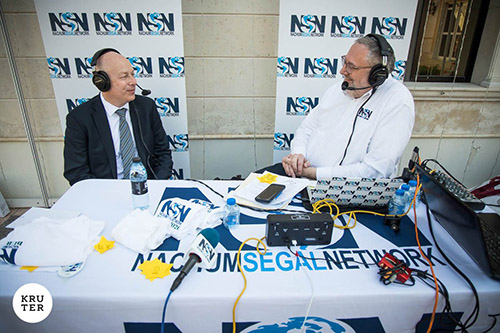
Nachum Segal has broadcast his program of Jewish news, sports, commentary and music all over the United States and Israel in his 35 years on the air. But never did he imagine he would be broadcasting his popular JM in the AM program from the United Arab Emirates (UAE).
Yet, December 8-10 his programs came to listeners from Dubai, newly open to Jewish tourism as a result of the UAE and Bahrain signing a historic peace deal with Israel several months ago.
“I didn’t know what to expect,” acknowledged Segal in a phone interview with The Jewish Link. “As a person who grew up at a time when we were encouraged to believe that Arabs were not to be trusted, it was eye-opening.”
Segal found its citizens to be “very friendly, very warm people” without any hint of anti-Semitism.
“I don’t know why they told us wearing a yarmulke would be a problem,” said Segal. “I felt more secure and safe than walking around town in Venice or Paris. People came up to us to ask about Israel and we were made to feel extremely comfortable.”
Segal is the New Jersey-based president of the Nachum Segal Network, a leading internet radio network, and has been broadcasting his JM in the AM talk show since 1983.
His UAE broadcasts were made from the Chabad Jewish Community Center in Dubai, a Hilton hotel and the Renaissance Downtown Hotel where the main synagogue of Dubai, which is Orthodox, is temporarily meeting in a conference room.
One of the aspects of the trip that proved especially illuminating to Segal was the vibrancy of the Jewish community and its accommodation of the great influx of Jewish tourists, particularly Israelis.
“Through interviews and guests over the last several years we were informed that there was a limited Jewish community in Dubai and that the Chabad center only attracted limited tourists,” he said. “However, once the announcement was made in September all of a sudden there was this tremendous rush of Israelis and Jews from around the world.”
There are small expatriate Jewish communities—estimates of its size vary from several hundred to 1,500—in the UAE.
As tens of thousands of tourists poured in, the Chabad center quickly increased its staff from five to 40, no longer has to “scratch together” a minyan and accommodates 500 guests for its Shabbos meal, said Segal. However, the COVID crisis has temporarily put a damper on travel.
During his time there, Segal witnessed a boom in “frum tourists” and those in the technology business from all over the world, especially Israel.
“There was a lot of Hebrew in our hotel, a lot of yarmulkes around town,” he recalled. “It was really surreal.”
Guests on his broadcasts included those who traveled with him from the U.S., including Jason Greenblatt, former assistant to President Donald Trump and special representative for international negotiations, who helped negotiate the Mideast peace plan; Jewish residents of the UAE, including Rabbi Elie Abadie, formerly of the Edmond J. Safra Synagogue in Manhattan, who recently relocated to Dubai to become its senior rabbi, and Chabad Rabbi Mendel Duchman, one of the first Jewish leaders to come to the UAE; and native Arabs, many of whom have done business abroad.
“Some of the Arabs are already doing business in Israel and they talked about the respect they have for their Jewish neighbors,” he said. “Everybody emphasized the tremendous respect there is for other religions. Many came with Jewish friends and business associates. They are excited to visit Israel. They are all serious businessmen and can see the future 40, 50 years from now. They are very focused on that future and see themselves as trailblazers and believe other Arab countries will soon follow suit.”
Segal said businessmen and women in the UAE have already invested in Israel’s extensive and highly regarded technology industry, seizing on the new opportunity.
“Once the stigma of the Arab people toward Israel is lost, there will be more business with Arab countries, which is good for Israel,” predicted Segal, adding, “I think the Palestinians are going to be looking closely to be seeing if they were remiss in missing all opportunities they had to make peace with Israel.”
And Segal’s great takeaway from his excursion is one of optimism for a peaceful and prosperous future for Israel.
“I want people in America and in other parts of the world to know I saw with my own eyes that Arabs respect and are ready to work with Israel.”
By Debra Rubin












